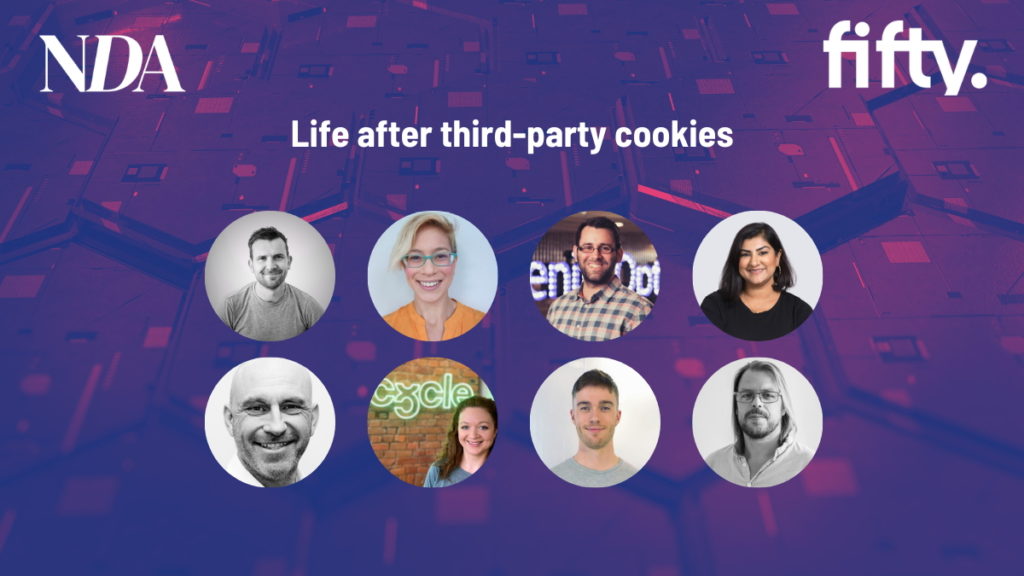Third-party cookies seem to be one of the few things we talk about these days. Like broken records, we’re constantly going on about identity, tracking, measurement, and all the other related buzzwords. But these records certainly aren’t playing our favourite songs.
With Google delaying its deprecation of cookies until 2024, some may be wondering whether it will ever happen, and if there’s really any incentive for them to give up cookies.
To discuss that, and some other key topics, we teamed up with Fifty.io to gather a group of experts. The roundtable featured Steve Taylor, Joint Chief Strategy Officer at VCCP Media; Gabriella Krite, Head of Digital Operations at The Kite Factory; Tim Jones, Head of Digital Delivery at The Specialist Works; Leena Vara-Patel, Managing Director at 13minutes, The7Stars’ business acceleration consultancy; Guillermo Dvorak, Head of Digital at Total Media; Alex Wood, MX Business Director at Bicycle London; Alex Hawkesworth, Head of Product at Fifty; and Simon Eaton, Managing Director at Fifty.
Total Media’s Dvorak opened the discussion reminding everyone how old and outdated cookies are (the cookie was invented way back in 1994). And pointed to the alternatives that are already better than cookies.
“Cookies are very old. When they were built nobody was thinking about what the internet was going to become, and all the connected devices we have – even your fridge can connect to the internet now. So, cookies are already very outdated, and not fit for purpose,” said Dvorak. “There are already vastly superior options, like contextual targeting and behavioural targeting.
“Regardless of Google’s position, the marketing ecosystem – with new walled gardens being raised – is being forced out of using cookies.”
Taylor of VCCP Media agrees that we definitely see an end to cookies one way or another, pointing to a number of different reasons for why he thinks “we will see an end to them”.
“People don’t want to be tracked,” he said. “They really don’t. People want more relevant ads as much as they want neat holes in their heads. Legislators don’t want us to track people. And now you’ve got tech platforms like Apple who say they’re protecting privacy and building their own stuff.
“Also, Google may sell its ad tech business off. And, if it does, it’s got no further incentive to maintain anything. I think its hand is going to be forced anyway.”
Fifty’s Eaton takes a more cynical view of the cookie situation, believing that the major tech brands are only supporting the end of third-party cookies because they want to keep their reputations and the value of their companies intact.
“We’ve seen a few really big tech brands which really do want to stop using the cookie, because it’s for their share price,” claimed Easton. “They’re protecting their brand image.”
Finding the solution
Whatever the reason behind the deprecation of third-party cookies, the industry is working hard to find solutions. And there are several questions surrounding identity solutions in particular, and whether it’s a better idea to go identity-free going forward.
Bicycle London is currently using a mixture of identity solutions and contextual, because it’s not valuable to use the latter for all brands, according to Wood.
“It really depends on the client. We’re doing quite a bit of contextual, but it doesn’t work for every brand and every vertical. For some of our food brands, contextual doesn’t necessarily work by itself, for example,” Wood explained. “If you look at something like Branston pickle, people who buy it are either driven by habit or nostalgia. It’s not a food interest. And you can’t just contextually target sandwich recipe environments, because it doesn’t scale. So, it’s about trying to build out personality- or value-driven main shopper audiences, which is a bit tricky.”
At The Kite Factory, the agency faces a similar issue.
“We have the same problem with charity clients as well,” said Krite. “Contextually targeting for a generic charity audience is next to impossible. So, we very much go down the route of trying to look at partners who have signals based on what people are talking about. In terms of the value of those signals, I’s still questionable. But, for a charity audience, we are really stuck in that middle ground of ‘where do we go from here?’ And we are very reliant on ad tech to try to help up to move forward in that.”
Measuring up
One of the major talking points around third-party cookies is measurement. And, in the opinion of Hawkesworth from Fifty, holistic approaches to measurement are the “only way”.
“We need to start to understand the impact of different channels, and their combinations with other channels, and what the total net output is of those combinations,” he explained. “But getting clients to understand that we need to switch these campaigns on and off in different patterns to start to build a model is a really hard conversation to have with them.”
13minutes’ Vara-Patel believes the measurement problem comes down to “a blend of really bad measurement habits” that have stemmed from clients not having “the right infrastructure in place”. She said: “Trying to get them to transform from that point of view is incredibly difficult. They’ve got legacy systems in place that aren’t easy to use, and haven’t been implemented correctly. And, in terms of measurement, that makes it incredibly difficult.”
Overall, the problems facing the industry around the deprecation of third-party cookies, and the fallout of that, comes down to certain sections of the industry kicking the can down the road – whether that’s Google, ad tech vendors, or brands not embracing better practices or technologies.
“It’s very easy to push responsibility one step further down. It’s that way in every industry, and that’s the problem we’re facing,” said Jones from The Specialist Works. “It’s always, ‘it’s their responsibility. No, it’s theirs’.”











